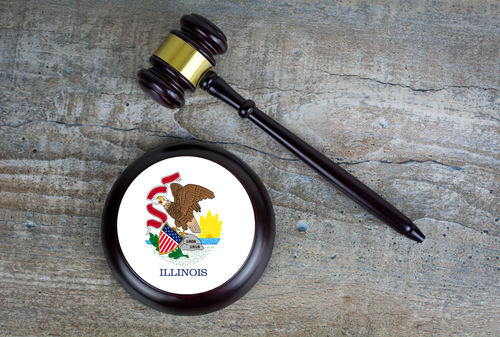Law firm press release didn't violate patient confidentiality law, top Illinois court rules

A law firm press release describing its client’s suicide attempt in a hospital emergency room did not violate Illinois law on patient confidentiality, the Illinois Supreme Court has ruled. Image from Shutterstock.
A law firm press release describing its client’s suicide attempt in a hospital emergency room did not violate Illinois law on patient confidentiality, the Illinois Supreme Court has ruled.
The state supreme court upheld the dismissal of the confidentiality case against the firm formerly known as Burke Wise Morrissey & Kaveny in a Nov. 30 opinion.
The firm’s May 2015 press release had announced a $4.2 million verdict for its client in a medical-malpractice trial.
The Illinois Supreme Court ruled that the confidentiality law didn’t apply because the client had waived confidentiality when his medical records were publicly disclosed at his medical-malpractice trial.
The state supreme court also noted a common law right of access to court records that is essential to democracy.
“Holding legal counsel liable for speaking about voluntarily released information in a public trial would fly in the face of these basic principles, which are at the core of our judicial system and our democracy,” the Illinois Supreme Court said.
The press release discussed the suicide attempt in which the client stabbed himself multiple times, the injuries that he sustained and his subsequent diagnosis. A lawyer with the firm, Elizabeth A. Kaveny, also discussed the case with the Chicago Daily Law Bulletin.
The firm and Kaveny were named as defendants in the lawsuit alleging a violation of the Illinois Mental Health and Developmental Disabilities Confidentiality Act. The plaintiff was identified only as John Doe, but the opinion did say he is a former lawyer. The Illinois Supreme Court ruled for both defendants.
In his opinion for the court, by Justice P. Scott Neville Jr. said Doe had voluntarily “testified about his history of depression and anxiety, his initial suicide attempt that resulted in his hospitalization, the suicide attempt that occurred during his hospitalization, his continued hospitalization and care at numerous institutions after his suicide attempts, his diagnosis and treatment for a brain injury following his suicide attempts, his ongoing cognitive difficulties that prevented his return to practicing law, and the medications he was taking to treat his mental health conditions.”
“The information was shared during a public proceeding, and there is no indication in the record that an effort was made to seal the record from public view or access,” Neville said. “Therefore, Doe’s public disclosure of his mental health information ‘took away its confidentiality,’ and it cannot regain its confidentiality after disclosure.”
The state supreme court also ruled for the firm and Kaveny on a second ground—that the confidentiality law protected only records made in the course of providing mental health treatment and didn’t apply to trial disclosures.
The Illinois Supreme court noted that Illinois later broadened the law to apply to disclosures made outside the therapeutic relationship but said the amendment didn’t apply because it wasn’t retroactive.
The Illinois Supreme Court reversed an appeals court decision that allowed Doe’s suit to proceed.
Law.com and Reuters had coverage of the decision. According to Law.com, Kaveny is now a managing partner at Kaveny & Kroll in Chicago.



